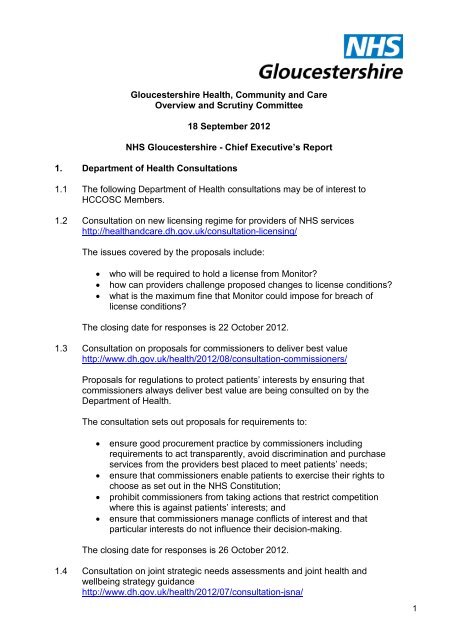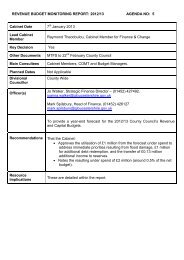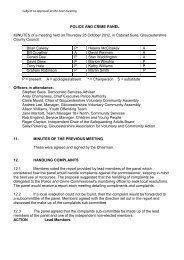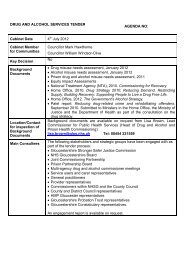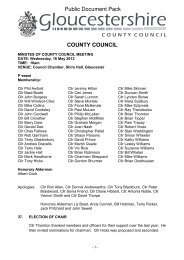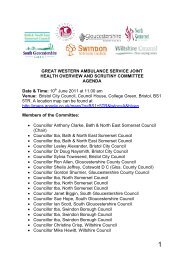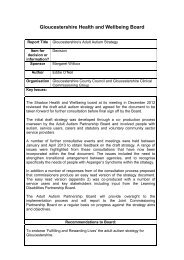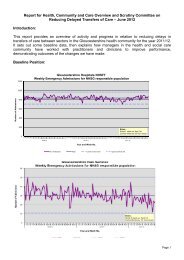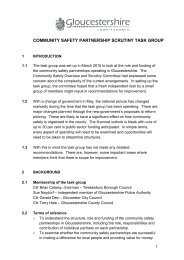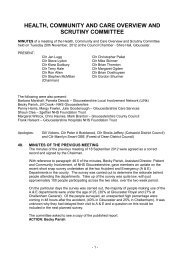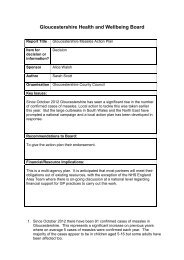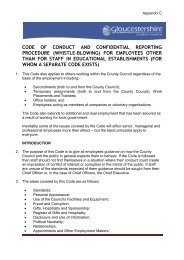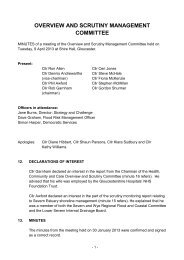NHS Gloucestershire CEO Report PDF 143 KB
NHS Gloucestershire CEO Report PDF 143 KB
NHS Gloucestershire CEO Report PDF 143 KB
Create successful ePaper yourself
Turn your PDF publications into a flip-book with our unique Google optimized e-Paper software.
<strong>Gloucestershire</strong> Health, Community and Care<br />
Overview and Scrutiny Committee<br />
18 September 2012<br />
<strong>NHS</strong> <strong>Gloucestershire</strong> - Chief Executive’s <strong>Report</strong><br />
1. Department of Health Consultations<br />
1.1 The following Department of Health consultations may be of interest to<br />
HCCOSC Members.<br />
1.2 Consultation on new licensing regime for providers of <strong>NHS</strong> services<br />
http://healthandcare.dh.gov.uk/consultation-licensing/<br />
The issues covered by the proposals include:<br />
• who will be required to hold a license from Monitor?<br />
• how can providers challenge proposed changes to license conditions?<br />
• what is the maximum fine that Monitor could impose for breach of<br />
license conditions?<br />
The closing date for responses is 22 October 2012.<br />
1.3 Consultation on proposals for commissioners to deliver best value<br />
http://www.dh.gov.uk/health/2012/08/consultation-commissioners/<br />
Proposals for regulations to protect patients’ interests by ensuring that<br />
commissioners always deliver best value are being consulted on by the<br />
Department of Health.<br />
The consultation sets out proposals for requirements to:<br />
• ensure good procurement practice by commissioners including<br />
requirements to act transparently, avoid discrimination and purchase<br />
services from the providers best placed to meet patients’ needs;<br />
• ensure that commissioners enable patients to exercise their rights to<br />
choose as set out in the <strong>NHS</strong> Constitution;<br />
• prohibit commissioners from taking actions that restrict competition<br />
where this is against patients’ interests; and<br />
• ensure that commissioners manage conflicts of interest and that<br />
particular interests do not influence their decision-making.<br />
The closing date for responses is 26 October 2012.<br />
1.4 Consultation on joint strategic needs assessments and joint health and<br />
wellbeing strategy guidance<br />
http://www.dh.gov.uk/health/2012/07/consultation-jsna/<br />
1
The draft guidance, on which views are being sought, provides a framework for<br />
<strong>NHS</strong> and local government to work together to undertake joint strategic needs<br />
assessments(JSNA) and joint health and wellbeing strategies (JHWS). The<br />
draft guidance:<br />
• lays out duties that underpin JSNAs and JHWSs to be undertaken by<br />
clinical commissioning groups and local authorities through health and<br />
wellbeing boards from April 2013;<br />
• explains how JSNAs and JHWSs will fit together with commissioning<br />
plans in the health and care system; and<br />
• sets out how the JSNA and JHWS process will enable the <strong>NHS</strong> and local<br />
government to make real improvements to the health and wellbeing of<br />
local people.<br />
Views on the guidance should be fed back by 28 September 2012.<br />
1.5 A full listing of all ‘live’ and ‘closed’ Department of Health consultations can be<br />
accessed via the Department of Health website:<br />
http://www.dh.gov.uk/en/Consultations/Liveconsultations/index.htm<br />
This website also includes Government responses to closed consultations.<br />
2. Early Years Specialist Service Update<br />
2.1 Members of the HCCOSC will be aware of the joint work being undertaken with<br />
<strong>Gloucestershire</strong> County Council under the auspices of the Joint Commissioning<br />
Partnership for implementation of a jointly developed Strategic Commissioning<br />
Framework for Children and Families in the Early Years.<br />
2.2 Amongst other things this aligns the development and commissioning of<br />
services for children in the early years against agreed high level outcomes and<br />
other strategic imperatives which maximise the opportunities for improving<br />
outcomes for children and families as well as bringing benefits to commissioner<br />
and provider organisations. For example, <strong>Gloucestershire</strong> County Council has<br />
recently made the decision to tender <strong>Gloucestershire</strong>’s Children’s Centres and<br />
this will be done in a way which is complementary to the development of Health<br />
Visiting Services. <strong>NHS</strong> <strong>Gloucestershire</strong> is also committed to implementing the<br />
national target to increase the number of health visitors by 2015.<br />
2.3 An additional important strand of the overall early years work is the<br />
development of a specialist service for children under 5 who are experiencing<br />
chronic neglect as a result of substance misuse, mental health or other needs<br />
of their parents. This will take the form of a multi-disciplinary team made up of<br />
social workers, health visitors, substance misuse and mental health workers<br />
and a speech and language therapist to work intensively with children<br />
and parents and incorporating a Family Drug and Alcohol Court and adapted<br />
Family Nurse Partnership approach, both of which are designed to speed up<br />
the achievement of improved outcomes and securing a more settled future for<br />
the children involved.<br />
2.4 <strong>NHS</strong> <strong>Gloucestershire</strong> has agreed to the secondment of four health visitors into<br />
this new team (as a result of its own expansion programme for health visiting<br />
services as described above) and GCC will be investing through other <strong>NHS</strong> and<br />
county council provider services for the other components of the team, using<br />
2
the flexibilities of the Section 75 Agreement for commissioning services agreed<br />
between the two organisations in 2010.<br />
2.5 It is intended that the service will be operational by October 2012 and will run<br />
for 3 years initially with funding for the third year dependent upon successful<br />
evaluation in year 2. Further information on the early years work generally and<br />
this service in particular is available at:<br />
http://www.gloucestershire.gov.uk/extra/eystrategy<br />
3. IVF Commissioning Policy Update<br />
3.1 The <strong>Gloucestershire</strong> and Swindon PCT Cluster, through the Clinical<br />
Commissioning Group Shadow Boards, recently adopted a new, NICE<br />
compliant policy for the provision of IVF treatment, which allows for three cycles<br />
of treatment. Further work has been going on with providers and other<br />
stakeholders to implement this policy by 1st October 2012. In the course of this<br />
work, issues relating to surrogacy still require clarification.<br />
3.2 Surrogacy is a complex legal and ethical issue, and it has been decided to<br />
exclude surrogacy from the agreed IVF policy and include a statement in the<br />
policy to that effect, adopting a policy for surrogacy as an intervention not<br />
normally funded.<br />
4. Emergency care pathway – September 2012 update<br />
4.1 In July 2012, HCCOSC members received a detailed report through the <strong>NHS</strong>G<br />
Chief Executive <strong>Report</strong> regarding the Emergency Care Intensive Support Team<br />
Review of Urgent and Emergency Care in <strong>Gloucestershire</strong>. HCCOSC members<br />
requested regular updates against actions, which can be found below:<br />
5. Telehealth<br />
• Performance have been maintained above the target of 95% since May<br />
2012 despite high levels of attendances (10,625 in July an increase of<br />
389 compared to July 2011)<br />
• Changes to the rostering of staff have reduced the number of vacant<br />
shifts and hence the reliance on locums.<br />
• The <strong>Gloucestershire</strong> Royal Hospital helipad reopened on 12 July, 2012<br />
• Signs have been installed at Cheltenham General and <strong>Gloucestershire</strong><br />
Royal Hospitals, stating "save the emergency department for real<br />
emergencies". A new web page, which displays live waiting times for the<br />
county's emergency departments and minor injury units, has gone live<br />
on the GH<strong>NHS</strong>FT website. http://www.gloshospitals.nhs.uk/en/Wards-<br />
and-Departments/Departments/Accident-and-Emergency-<br />
Department/AE-Waits/<br />
5.1 88% of the 305 patients receiving telehealth services in <strong>Gloucestershire</strong> would<br />
recommend the service to their friends and families, and 85% rate the service<br />
as either excellent or good. These are the findings from an anonymous survey<br />
of telehealth patients recently carried out by <strong>NHS</strong> <strong>Gloucestershire</strong>. The survey<br />
also revealed that patients find telehealth reassuring as it makes them less<br />
3
anxious about their condition and gives them peace of mind and confidence to<br />
manage their condition better, without having to make a trip to see their GP.<br />
5.2 <strong>NHS</strong> <strong>Gloucestershire</strong> launched its telehealth programme in June 2011 in a bid<br />
to support the growing number of people living with long term conditions in the<br />
county, which is around 6,000 of the county’s population of approximately<br />
600,000 people. Telehealth can support these patients, giving them a greater<br />
understanding and awareness of their condition and the reassurance they need<br />
to help them manage it more effectively.<br />
5.3 Telehealth enables patients’ vital signs such as weight, blood pressure and<br />
oxygen levels to be monitored from their own homes easily, securely and<br />
safely. The results are viewed on a daily basis by a triage team who work<br />
closely with clinicians to ensure timely and appropriate referral and support is<br />
provided as required.<br />
5.4 The telehealth programme is backed by the findings of a recent national study,<br />
the Whole System Demonstrator programme, which found that telehealth is<br />
associated with lower mortality rates (45%) and fewer hospital admissions<br />
(11%, with a 20.6% reduction in emergency admissions).<br />
5.5 Most of the county’s 85 GP practices are now referring patients they believe will<br />
benefit from telehealth, which can improve quality of life and result in fewer<br />
hospital admissions.<br />
6. Maintaining Quality During The Transition<br />
6.1 In March 2011 the National Quality Board (NQB) published its report:<br />
Maintaining and improving quality during the transition: safety, effectiveness,<br />
and experience. The report sets out the requirement to develop a legacy<br />
handover document to ensure that organisational memory on quality issues<br />
was not lost during PCT and SHA clustering and the ongoing transition<br />
process. This led to the development of the <strong>NHS</strong> <strong>Gloucestershire</strong> and <strong>NHS</strong><br />
Swindon Cluster Legacy document, which was presented to Board in<br />
November 2011.<br />
6.2 The NQB has now published further guidance on the handover process:<br />
Maintaining Quality During the Transition: Preparing for handover. This new<br />
guidance builds on lessons learnt during the PCT and SHA clustering process<br />
and sets out new handover requirements designed to ensure that any risk to<br />
quality during the transition is reduced, and that business continuity is<br />
maintained. This forms just one part of the wider transitional arrangements<br />
required to implement the changes set out in the Health and Social Care Act<br />
2012.<br />
6.3 The report sets out a requirement for Directors of Nursing and Medical<br />
Directors to lead on the development of a Quality Handover Document that can<br />
be used to support the transition. PCT Clusters were required to develop a plan<br />
for how this Handover Document would be produced, and to submit this to the<br />
SHA by 23rd June 2012. Work is now underway to produce the first draft of the<br />
Quality Handover Document, which will need to be submitted to the SHA by<br />
28th September 2012. The draft Document will be shared with HCCOSC and<br />
LINk members of the <strong>NHS</strong> <strong>Gloucestershire</strong> Reference Group for comment. The<br />
4
final version of the Quality Handover Document will be presented to Board in<br />
March 2013 for final sign off, before being shared with successor organisations.<br />
7. Annual <strong>Report</strong> on the progress of implementation of The <strong>NHS</strong><br />
Constitution in <strong>NHS</strong> <strong>Gloucestershire</strong> and <strong>NHS</strong> Swindon Cluster<br />
7.1 The results of the fourth Audit report on implementation of The <strong>NHS</strong><br />
Constitution carried out by <strong>NHS</strong> South showed <strong>NHS</strong> <strong>Gloucestershire</strong> and <strong>NHS</strong><br />
Swindon Cluster rated overall as compliant or ‘Green’. The Audit covered the<br />
following organisations:<br />
• <strong>NHS</strong> <strong>Gloucestershire</strong><br />
• <strong>NHS</strong> Swindon<br />
• <strong>Gloucestershire</strong> Hospitals <strong>NHS</strong> Foundation Trust<br />
• Great Western Hospital <strong>NHS</strong> Foundation Trust<br />
• 2Gether <strong>NHS</strong> Foundation Trust<br />
• Great Western Ambulance <strong>NHS</strong> Trust<br />
7.2 Published on 4 July 2012, The <strong>Report</strong> on the effect of The <strong>NHS</strong> Constitution<br />
informs efforts to embed fully the Constitution throughout the <strong>NHS</strong>.<br />
7.3 The report sought to clarify the effect of the <strong>NHS</strong> Constitution on those who use<br />
<strong>NHS</strong> services and who work in the <strong>NHS</strong>. It considered whether, and to what<br />
extent, the Constitution has made a difference to patients, staff, carers and the<br />
public, and examined the degree to which it is succeeding in its aims.<br />
7.4 The report showed that three years on from the launch of the Constitution, the<br />
<strong>NHS</strong> remains true to its fundamental principles and values as expressed in the<br />
<strong>NHS</strong> Constitution. However, public awareness of the Constitution remains<br />
generally low and there is little evidence that patients use it as a means of<br />
exercising their rights. Staff awareness of the <strong>NHS</strong> Constitution is significantly<br />
higher than among the public but still few feel well informed about it.<br />
7.5 The Health and Social Care Act 2012 has strengthened the legal foundation for<br />
the <strong>NHS</strong> Constitution: the <strong>NHS</strong> Commissioning Board and clinical<br />
commissioning groups will have clear duties to promote the <strong>NHS</strong> Constitution.<br />
7.6 The Department of Health will hold the <strong>NHS</strong> Commissioning Board to account<br />
for meeting its legal duty to promote the Constitution. It will also hold the Board<br />
to account for delivering on the Rights and Pledges contained within it.<br />
7.7 The Future Forum will now consider how the Constitution can be strengthened<br />
and reinforced for the future, in terms of both content and awareness.<br />
7.8 The <strong>NHS</strong> Future Forum will present its advice to the Government in the<br />
autumn. Following this, there will be a public consultation on any changes to<br />
strengthen the Constitution so that patients, staff and the public have the<br />
chance to have their say. The <strong>Report</strong> can be found at:<br />
https://www.wp.dh.gov.uk/publications/files/2012/07/report-on-the-effect-nhsconstitution-0407-2.pdf<br />
5
8. Prison Inpatient Services at HMP Gloucester<br />
8.1 The aim of prison health care is to give prisoners access to the same range and<br />
quality of health care services that are available to people living in the<br />
community. Historically there have been insufficient facilities for inpatients<br />
within prison establishments. Beds were used for:<br />
• Social care for older, disabled and/or vulnerable people where the prison<br />
lacked alternative facilities<br />
• Care for those waiting for mental health Act (S47/48) transfers to<br />
external mental health facilities<br />
• Observation for those deemed to be at risk of self-harm<br />
• End of life care<br />
• Transfers of challenging prisoners from segregation units<br />
• Accommodation for cleaners and/or lodgers with no healthcare needs.<br />
8.2 The Regional Offender Health Team has led a drive over the past nine years to<br />
reduce inpatient beds within the prisons in the South West with the aim of<br />
ultimately closing them while ensuring prisoners in need of health care are<br />
treated in the most appropriate setting. This policy is supported by an impact<br />
assessment.<br />
8.3 HMP Gloucester had been successful in reducing the number of prisoners<br />
staying inappropriately in the Assessment and Treatment Unit (ATU) (inpatient<br />
unit) in line with regional policy. There was a successful reduction of beds from<br />
11 (in 2006) to eight (2010) and down to five (2011). The decision to reduce<br />
these beds has previously been discussed with the HCCOSC. During 2011/12<br />
bed occupancy remained stable at around 8.2%. This was achieved by close<br />
working between the Governor, Healthcare and Prison staff.<br />
8.4 There was always an intention to close the remaining beds and following a<br />
recent recommendation from the Regional Offender Health Team, a local<br />
agreement was made to action this. This decision was strengthened by findings<br />
from a ‘Her Majesties Inspectorate of Prisons’ (HMIP) inspection to HMP<br />
Gloucester in July 2012. As a result of this, the Prison Governor decided to<br />
close the remaining healthcare beds. The vulnerable persons Unit (VPU) and<br />
the Segregation Unit have also been closed to provide better regimes for the<br />
whole the prison population in HMP Gloucester.<br />
8.5 Those prisoners who would have accessed prison inpatient beds are now either<br />
treated by nursing and prison staff on the Wings, or are sent to other facilities,<br />
which can provide more suitable accommodation for their needs.<br />
8.6 Nursing staff who had worked in the ATU on night duty have been relocated to<br />
the new ‘first night’ centre, where they can better perform mental health and<br />
physical health observations. This arrangement has been fully supported by the<br />
Regional Lead for Prisons and the Offender Health Team. There are plans to<br />
utilise the ATU to develop services, such as health improvement, therapeutic<br />
activities and day care, which require a solid partnership approach. The impact<br />
of the closure of the remaining beds is being monitored through the Prison<br />
Health Partnership Board, which drives quality improvements in prison health<br />
care.<br />
6
9. 15 Steps Challenge in for inpatient services – mental health services<br />
9.1 The <strong>NHS</strong> Institute for Innovation and Improvement has launched a toolkit to<br />
help <strong>NHS</strong> organisations to gain a better understanding of how patients feel<br />
about the care provided. The 15 Steps Challenge encourages patients and<br />
staff to work together to identify improvements which may enhance the patient<br />
experience, highlighting what is working well and what might be done to<br />
increase patient confidence. The 15 Steps Challenge is in its draft format for<br />
mental health settings.<br />
9.2 2gether <strong>NHS</strong> Foundation Trust has been invited to participate in the pilot<br />
process and is now actively involved in this work<br />
10. Emotional Wellbeing Health Promotion taster sessions with Seldom<br />
Heard communities<br />
10.1 Emotional Wellbeing Health Promotion taster sessions have been delivered by<br />
2gether <strong>NHS</strong> Foundation Trust to various communities including the Chinese<br />
Parents and Children’s Association, Asian Carers, Pharmacy staff in BME<br />
communities. The sessions have been well received and regarded as helpful.<br />
Some participants have chosen to undertake further in-depth sessions of emotional<br />
well being.<br />
11. Awareness activities for people with learning disabilities<br />
11.1 <strong>NHS</strong> <strong>Gloucestershire</strong>, <strong>Gloucestershire</strong> Voices and <strong>Gloucestershire</strong> County Council<br />
and 2gether <strong>NHS</strong> Foundation Trust held the fourth Big Health Check day at the<br />
National Star College, Ullenwood in May 2012. The event was attended by over<br />
100 people who either had a learning disability or cared for someone with a<br />
learning disability.<br />
11.2 The day focused on health and wellbeing and participants had the opportunity to<br />
find out more about local services and get involved in interactive sessions covering<br />
topics like exercise, pharmacy and oral health care.<br />
11.3 <strong>Gloucestershire</strong> Voices performed a short play called ‘Listen to me’. This was a<br />
light hearted but thought provoking play about a visit to a hospital for someone with<br />
learning disabilities and focused on what could go wrong and how this could be<br />
done better. The play was filmed and will be used as a training tool for ‘Health<br />
Inequalities Awareness training’ in the community and hospitals.<br />
11.4 Attendees were also able to have a look around an ambulance and talk to<br />
paramedics as well as visit a health booth, which was run by learning disability<br />
nurses.<br />
12. Health and Wellbeing Strategy and Strategy for Care<br />
This is covered under a separate item on the HCCOSC Agenda.<br />
13. <strong>Gloucestershire</strong> Care Services<br />
This is covered under a separate item on the HCCOSC Agenda.<br />
Jan Stubbings, Chief Executive, <strong>NHS</strong> <strong>Gloucestershire</strong><br />
September 2012<br />
7


